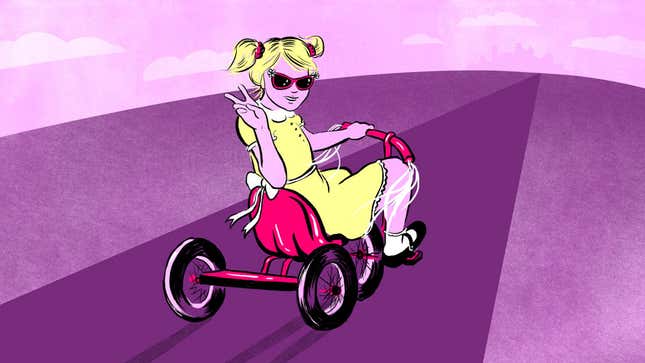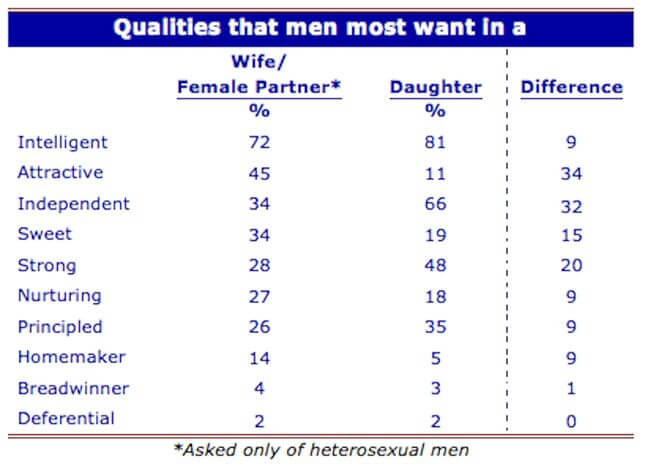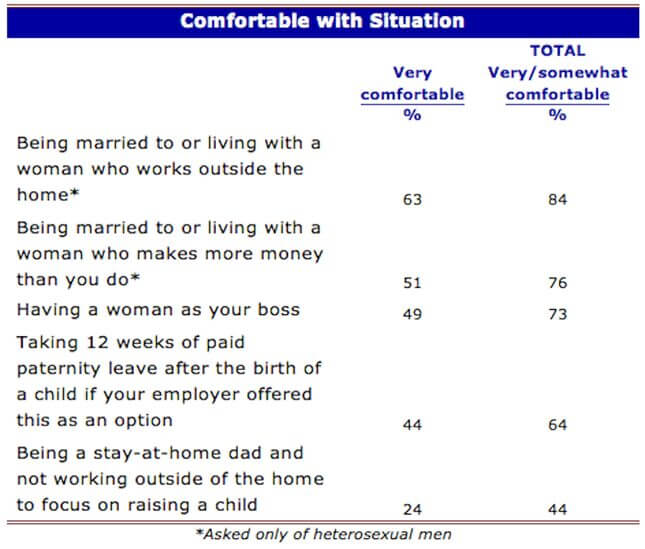What Do Men Want? Obedient Wives and Independent Daughters, Apparently
Latest

First, the “good” news: Some 34 percent of hetero men want a wife who is independent. Bad news: If you had a daughter with that dude, his preference for this trait in your offspring would nearly double to 66 percent. Is this logical as the known universe, or should we all hook paws and (independently) drive ourselves off a cliff?
Calm down, though, he also wants you to be smart—72 percent of men surveyed in this national poll of 818, published recently in The Shriver Report: An Insight Into the 21st Century Man, value intelligence in a wife. Of course, more men—81 percent—wanted intelligence for their daughters, and who could blame them? What’s the point of procreation if a man can’t see the fruit of his loins outwit Mom in a game of chess one day?
Another question: How much do you really mind these differences? After all, 34 percent of men greatly value sweetness in a partner, while only 19 percent care if their daughters are more sugar than spice. But the problem is, women aren’t the abstractions of their relationships to men. The ideal daughter these men are imagining will grow up contending with other men’s imagining of their ideal wife. And the differences are significant: 45 percent of men value an attractive wife, while only 19 percent worry about their daughters’ looks. 48 percent of men want strong daughters and only 28 percent want strong wives. (Hard to say if strong in this sense literally means “able to lift stuff” or like, strong-willed.)
Here’s a side-by-side comparison of those desired qualities:

On one level, the beauty preference is totally logical. As commenter idrive405 on the WaPo piece notes:
Of course men (and women) want their spouses to be attractive. But it would be creepy and quasi-incestuous to prioritize your child’s beauty.
Wouldn’t it? Though most of us want our children to have everything working in their favor—be it looks, humor, or the ability to hold two opposing ideas in the mind at the same time—our love for our kids should be unconditional. We should want our children to possess all the good qualities that don’t draw on shallowness, while our spouses can, if we so desire, fulfill our most whimsical preferences. We choose our spouses; we don’t choose our children. I wanted a partner who could perform reverse osmosis while assembling IKEA furniture, and by god, that’s what I went for.
But if I may attempt to inhabit the mind of the average 18-to-49 year old white man with some college—something I jump at the chance to do whenever the opportunity arises—I’ll suggest a theory for what I think is going on. For them, a wife is a reflection ON you, while a daughter is an extension OF you. If you’re choosing a mate as most men would, based on (among other things) social approval, or the idea of the sort of wife you ought to have, you’re going to go with the generic, culturally sanctioned option, i.e., “sweet,” and “attractive,” and not necessarily “brilliant/ambitious hustler.” That men added in intelligence as a top quality is a sign of progress, when “smells good” probably used to be literally the only gauge at one point in our not-so-distant past.
A daughter, on the other hand, is a direct extension of your genes. Caring about your daughter’s smarts over her looks likely ensures that the legacy that you, Man Filling Out Survey, have been socialized into wanting for yourself: intelligence, capability, rather than beefcake-itude. (I’ll admit that this is a very reductive and alarmingly evo-psychy take, and quite generous of me, I might add. But I’m feeling hospitable.)
Over at the Washington Post, Danielle Paquette finds these differences disturbing, and links them to what is possibly more compelling in the Shriver Report study results anyway—the attitudes men still have RIGHT NOW have about the shifting landscape of us sweet, purty gals in society.
-

-

-

-

-

-

-

-

-

-

-

-

-

-

-

-

-

-

-

-

-

-

-

-

-

-

-

-

-

-

-

-

-

-

-

-

-

-

-

-









































